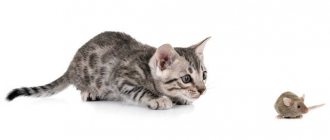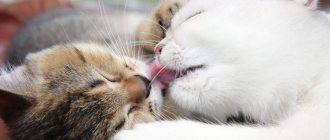According to statistics, there are currently more than 600 million domestic cats on our planet. They were domesticated about 9.5 thousand years ago and during this time humanity developed about 200 different breeds. They all differ in appearance and behavior, but most of them have one thing in common - running around at night. Owners of cats and cats often notice how in the evenings their pets rush around the rooms with bulging eyes. And the animals are not at all embarrassed by the fact that their owners are sleeping, so nothing prevents them from running over them, rustling bags and brushing objects off the table. In general, complete chaos. But why do domestic cats behave there? Are they temporarily going crazy, or are they seeing some mythical creatures that we don’t notice? Let's sort this issue out once and for all.
Something like this happens every night in apartments with cats.
Why don't cats sleep at night?
Most cats that sleep during the day do so for two obvious reasons: they are nocturnal animals and/or they don't get enough exercise. However, these are not the only reasons why they remain active at night, as environmental or health factors may also come into play. In general, this behavior is usually accompanied by other signs that can help us better identify the cause and discover whether it is a problem or part of its nature. Thus, paying attention to all their reactions is necessary to understand the animal and help it.
Whether you've just adopted a cat that won't let you sleep, or suddenly becomes restless at the end of the day, in this article we'll answer the question of why your cat won't sleep at night, detailing the most common reasons, and we'll help you solve the problem with our tips .
Sleep in fits and starts
You are mistaken if you think that cats sleep for 15-20 hours at a time. A cat's nap usually lasts between fifteen minutes and half an hour, and this makes up the majority of their sleep.
People also know how to sleep in this mode. According to NASA, it is ideal for humans to take a 10-20 minute nap. For bipeds, such a short sleep helps them become more attentive, reduce stress and improve memory.
For cats, short naps serve the same purpose, especially when it comes to hunting. If you look closely at how your cat sleeps, you will see that she is positioned in a position that makes it easy for her to jump up when prey approaches.
Cat, nocturnal animal
By nature, a cat is a nocturnal animal that prefers to hunt, feed and carry out its daily activities during the dark night. Due to the species' evolution to survive in the wild, they have excellent night vision, allowing them to see much better in low light conditions than in fully illuminated or daylight. This is due to the anatomy of the eye adapted for hunting at night, consisting of eye tissue called tapetum lucidum, which has the ability to absorb light before reaching the retina. Once absorbed, this tissue reflects it and gives the animal much more advanced vision in the dark.
Although some domestic cats have managed to adapt slightly to their sleeping hours, some still maintain their natural behavior and are more active at night. This can cause your cat to not sleep at night, and yes, she sleeps during the day.
The importance of a good bed
It's no secret that cats are much more graceful animals than dogs, and the lack of a comfortable and safe bed may be the reason why your cat is not sleeping at night. However, choosing the perfect cat bed may not be so easy as we must first meet our furry companion and get to know their tastes in terms of shape, size and structure.
There are a variety of pet beds and mattresses available today, and to choose the perfect product, it is important to observe the animals and pay attention to their preferences. In general, cats prefer beds that provide warmth and security, just the right size, because large ones are not very comfortable for them. So, if you notice that your cat has a certain affinity for your bed or sofa and never lies down on it, it's probably because she doesn't like it and you should change it.
The cat snores like a tractor
Yes, cats can snore. This can be nerve-wracking, but it's a good sign that your pet is as relaxed as possible. This sound may wake you up, but it is also an indicator that the cat is healthy.
As a cat owner, one of the easiest things you can do is monitor your cat's sleep. Only you can understand what is normal and what is not. If you notice changes in your animal's behavior, do not ignore them. Consult your veterinarian to help identify or rule out potential health problems that may be contributing to these changes. For now, relax, sit back and watch your cat snooze all day.
Lack of activity and exercise
Cats that don't normally get any exercise have a greater predisposition to become active during the night due to energy build-up. Despite their reputation for being calm and sedentary, cats are also animals that need to be exercised and physically and mentally stimulated through play. Unfortunately, myths that have arisen about the species have led many cat owners to believe that they do not need as much attention on their part. These animals also need to spend hours with their companions, play and exercise, and receive affection in order to feel properly.
Lack of play also causes cats to become bored. Which can ultimately become destructive to furniture, household items, etc. Therefore, it is also possible that the cat is staying awake at night to get your attention.
Do they spend many hours alone during the day?
Related to the previous point, cats that spend many hours alone during the day and do not have proper environmental enrichment use sleep. This way, when night falls, they are completely rested and ready to enjoy your company, trying to play with you or, if they fail, running around the house, jumping, meowing...
On the other hand, as we said, lack of mental stimulation can also cause boredom in cats, in addition to stress and frustration. All this means not only that the cat is not sleeping at night, but also in a number of symptoms, such as the aforementioned destruction of furniture and even showing a certain aggressiveness.
Cat dreams
All this talk begs the question: Do cats dream?
Clinical studies give a positive answer.
Scientists note that mammals have a REM sleep phase. While humans have 5 stages of sleep, cats only have two (REM and non-REM). Since they sleep most of the time, you may have caught your cat sleeping. This can be understood by characteristic twitching and other movements.
What do cats dream about? This is not yet known, but I will assume that they are dreaming about hunting and how to sleep even longer.
Are they hungry?
If your cat doesn't sleep at night and also goes to your bedroom to meow in your direction and get your attention, they may be asking for food. And if when you stand up to provide what they want, the animal understands that this way they get what they want. They don't do this to irritate your sleeping hours. They just don't know that it's something negative for you and something positive for them. Without realizing it, you are reinforcing this behavior rather than directing it toward what is best for both of you.
So, before going to bed, be sure to feed your pet properly and see if she comes to you or falls asleep. Another option for felines who tend to order food late at night may be to use an automatic food dispenser, as it is also not recommended to leave the animal hungry so as not to interfere with sleep.
Sleeping mode
Cats sleep so lightly that people joke that they are always on alert. And this applies not only to lions and tigers; domestic furry animals have hunting in their blood.
Although cats simply doze most of the time, they are capable of falling into deep sleep. The cycle of deep sleep lasts about five minutes, and then doze again. This continues until the cat wakes up.
Don't worry if your indoor cat sleeps a little longer. Their hunting territory is not as extensive as that of their outdoor and wild relatives. Domestic cats have virtually no energy, so they do not require as much energy.
They are looking for a couple
Cats' search is much more intense than dogs', driving them into despair if they are unable to mate. During this period, both females and males are more active at night, producing painful moans and meows that disturb the sleep of their guardians. Their suffering is such that their instinct may make them try to run away from home to find a partner. So, if your cat won't stop meowing at night, won't let you sleep, is restless, and is over 6 months old, she'll probably be on the lookout. Therefore, to avoid unwanted pregnancies, the most recommended solution is to sterilize the animal on time.
We recommend viewing
Do cats mate with their siblings? Do cats miss their owners when they are returned home? Black Cats
However, some cats prefer to roam at night. This is likely if the cat has impaired hunting instincts or has not been spayed or neutered. As already mentioned, cats enjoy the silence and solitude that night brings.
If your female cat is in heat, she will tend to be outside at night. She picks up the scent of intact catfish that patrol the area. This is why cats in heat yelp and howl after dark, trying to attract the attention of their mate.
If your cat is male and has not been neutered, he will also be eager to go outside. Uncastrated male cats always strive to reproduce. Night is an ideal opportunity for this, when there are no people in their way.
He is sick
If you've already ruled out the previous causes and you keep asking why your cat won't sleep at night and meows constantly, don't hesitate to contact your veterinarian to check if this is a health problem. While excessive meows are usually associated with emotional pain, they can also emit them to let us know that they are feeling physical pain or something is not going well in their body. Therefore, we recommend that you visit a specialist to have your animal undergo appropriate tests. How to make a cat sleep at night? As you have seen, there are several reasons why your cat is keeping you up at night, it is even possible that the answer lies in more than one reason. So, it may be that your cat prefers to sleep during the day for several of the reasons mentioned and not just one reason. Therefore, the first recommendation is to find the reason(s) to combat them and help your furry companion have a better quality of life. Having said that, consider the following tips:
- and exercise with your cat As we already said, physical activity is very important to keep her stimulated and tire her out so that when night comes, she is already tired. To do this, it is best to play at different times of the day. And if possible, complete the activities in the afternoon.
- Offer her a good bed. A comfortable, warm and safe place to sleep is key, so don't skimp on it and find the right mattress.
- Prepare proper environmental enrichment . Especially if they spend many hours alone during the day. It is important that they have toys and objects that provide stimulation and entertainment. You can choose scrapers with different levels, toys, mind games, and even olfactory stimuli such as placing catnip in different spots around the house.
- Adapt meal schedules. As we already pointed out, feed him before bed so he doesn't get hungry at night and can sleep.
- Consider adopting another cat. If the reason is lack of activity and you can't provide the hours of play you need, it might be more appropriate to add a new member to the family. This should be a thoughtful decision that analyzes the cat's character.
- Consider sterilization. You've already seen that searching is one of the most common reasons, so choosing to have your pet spayed may be the best solution. Besides keeping you both asleep at night, cats especially suffer during this process for not being able to do what their instinct dictates. On the other hand, sterilization has many benefits, such as reducing the chances of suffering from breast cancer, uterine infections or avoiding markings inside the house.
What are the benefits of sleep for animals?
In addition to the fact that sleep helps restore energy and strengthen the immune system, it is needed to consolidate new skills. It is known that during sleep the human brain processes information received during wakefulness. The brain also consolidates the skills acquired during the day. For example, if you spent the whole day learning to draw, your brain processes the information received overnight, and the next day your drawings will begin to turn out better. Scientists have found that the same thing happens to the brains of other mammals, including our favorites. This explains why kittens sleep so much.
In other words, sleep has three main functions:
- helps restore energy,
- strengthens the immune system,
- helps to develop.











